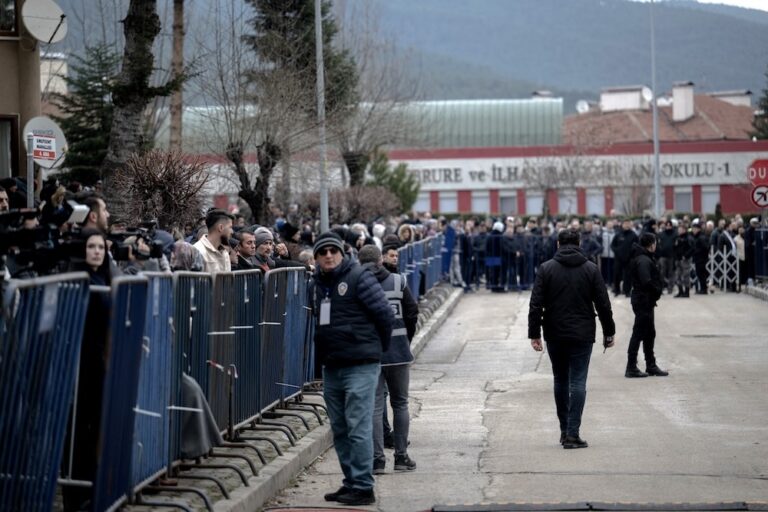(BIANET/IFEX) – The following is an abbreviated version of a 16 February 2007 BIANET press release: BIA2 Media Monitoring Desk releases its 2006 Report Freedom of Expression Cases Rise as 293 People Face Prosecution 2006 turned out to be the year when both the ruling Justice and Development Party (AKP) and the main opposition Republican […]
(BIANET/IFEX) – The following is an abbreviated version of a 16 February 2007 BIANET press release:
BIA2 Media Monitoring Desk releases its 2006 Report
Freedom of Expression Cases Rise as 293 People Face Prosecution
2006 turned out to be the year when both the ruling Justice and Development Party (AKP) and the main opposition Republican People’s Party (CHP) confirmed their support for restrictions on freedoms in Turkey.
We witnessed huge and numerous problems regarding freedom of expression and the press, caused by the wording as well as the philosophy behind the legislation that those two parties introduced as reforms in the National Assembly.
In an environment where state institutions and security forces are held sacred, the new Turkish Penal Code, promoting prison sentences and criminalizing the ambiguous act of “insulting Turkishness”, resulted in arbitrary trials and prosecutions, which brought the infamous article 301 of the Code to international attention in 2006.
In contrast to trends in international law, even criticism against state institutions was treated with the threat of imprisonment for terms ranging up to three years.
As a matter of fact, BIA2 Media Monitoring Desk’s compilations conclude that the number of prosecuted journalists, publishers and activists rose to 293 in 2006, in comparison to 157 in the previous year.
Seventy-two were prosecuted under article 301 of the Penal Code (article 159 in the previous legislation). Thirty-five people were tried under article 216; eight on Law on Crimes Against Ataturk and 24 were charged with allegations of “influencing the jurisdiction”, with reference to different legislation.
Our 37-page report classifies the 318 different cases and 449 journalists, publishers and activists involved under the headlines “attacks and threats”, “detentions and arrests “, “trials and initiatives”, “European Court of Human Rights”, “RTUK applications”, “adjustments and seeking justice” and “Reaction to censorship”.
Websites new targets for attacks
According to the report, 26 journalists and two media outlets were assaulted while seven journalists’ organisations were threatened and three websites hacked by nationalists in 2006. Thirty-three journalists and 16 media outlets had been assaulted the previous year.
For example, journalist Metin Uca was attacked and injured following a seminar in Gazi University and the offices of the daily “Cumhuriyet” were targeted with hand grenades on two occasions. Prime Minister Recep Tayyip Erdogan and other government members frequently made declarations where they blamed the press. Sports commentator Hasmet Babaoglu said that he’d received threats after criticizing Mateja Kezman’s transfer to Fenerbahce during the programme “90 Minutes”, broadcast on NTV.
Seven people convicted under article 301
Complaints filed by the General Staff, Police Department and nationalist circles as well as problems that arose during the judicial process brought article 301 of the Penal Code to international attention. The number of individuals tried under the article in question went up to 72, from 29 in the previous year.
Hrant Dink, Sabri Ejder Öziç, Eren Keskin, Aziz Özer, Erol Özkoray, Mehmet Fethi Dördüncü and Hanefi Bekmezci were convicted in those cases.
Before falling victim to murder on 19 January 2007, Turkish-Armenian writer Hrant Dink had been prosecuted once again for saying that “he recognizes the Armenian Genocide allegations” during an interview with the Reuters agency, and for publishing news about the campaign for the abolition of the very article he’d been tried under. The owner of his newspaper, “Agos”, Sarkis Seropyan, and director Arat Dink will also be tried on that count.
Thirteen of the cases filed under article 301 were acquitted, while five cases were dropped because of prescription or lack of consent from the Ministry of Justice.
Courts considered prone to influence by the press
Twenty-four journalists have been subjected to legal intervention with reference to articles 277 and 288 of the Penal Code and article 19 of the Press Law which defines the crime of “influencing a fair trial”.
“Hurriyet” daily columnist Ahmet Altan was tried and acquitted for his article titled “The Child Who Lost His Name”, in which he commented on documents related to an ongoing legal case.
Lube Ayar, İsmail Saymaz, Faruk Çakır, İbrahim Yıldız, Necdet Tatlıcan, Hrant Dink, Aydın Engin, Serkis Seropyan, Arat Dink, Güray Öz, Murat Yetkin, İlhan Selçuk, Mehmet Sucu, Murat Belge, İsmet Berkan, Haluk Şahin, Erol Katırcıoğlu, Hasan Cemal, Nalan Akgün, Azer Banu Kemaloğlu and Ender Can Cevahir frequented court rooms for allegations of attempting to influence the judicial process.
“Cumhuriyet” daily reporter Alper Turgut was convicted for reporting a case in which police officers were acquitted by prescription on allegations of torture.
(. . . )
For the full summary of the report, see: http://www.bianet.org/2006/11/01_eng/news92115.htm


